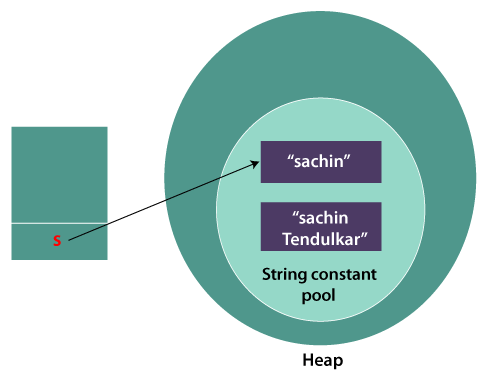Why Are Strings Immutable in Java? Insights into Memory Effectiveness
Why Are Strings Immutable in Java? Insights into Memory Effectiveness
Blog Article
Discovering the Advantages of Unalterable Strings in Modern Programs Paradigms
In the realm of modern-day programs paradigms, the principle of immutable strings stands as a cornerstone of robust software advancement. By adopting unalterable strings, developers can ensure improved information integrity, enhanced string safety and security, simplified debugging procedures, increased safety steps, and efficient efficiency optimization.
Boosted Data Honesty

By protecting against the adjustment of string things, immutability eliminates the threat of unintended adjustments to the data they hold. This not just boosts the protection of the details yet likewise boosts the reliability of the code that counts on these strings.
Immutability likewise sustains safer multithreading settings, as simultaneous accessibility to immutable strings does not position the threat of data corruption with simultaneous alterations. This residential property simplifies the process of dealing with strings in parallel shows circumstances.
In essence, immutability acts as a protective shield around the information stored within strings, improving their integrity by guaranteeing that as soon as defined, their values stay the same throughout the program's implementation.

Boosted String Safety
Unalterable strings boost the string safety of programs by ensuring that as soon as a string object is produced, its value can not be customized. This home eliminates the threat of simultaneous strings attempting to customize the exact same string concurrently, which can result in data corruption or inconsistent states in the program - Why are strings immutable in Java?. In a multi-threaded setting, where numerous strings gain access to and manipulate data all at once, the immutability of strings gives a level of security by assuring that the information continues to be the same throughout its lifecycle
Streamlined Debugging Processes
Offered the enhanced string security promoted by unalterable strings, a significant advantage develops in the world of streamlined debugging procedures. Immutable strings, as soon as produced, can not be modified, making it less complicated to map the flow of information and identify the source of pests in a program. This immutability ensures that strings continue to be regular throughout the implementation of the program, reducing the likelihood of unexpected modifications that can result in errors.
When debugging with mutable strings, developers typically run into concerns where a string's worth is customized accidentally, making it testing to identify the source of an insect. Nevertheless, with immutable strings, the information continues to be unmodified, allowing developers to concentrate on examining the real logic of the code instead of finding where and when a string was customized improperly.
Furthermore, immutable strings streamline the debugging procedure by making it possible for less complicated recreation of pests. Considering that unalterable strings do not transform state, programmers can recreate and research insects better, leading to quicker identification and resolution of problems within the codebase. This structured debugging operations ultimately adds to greater software program top quality and improved overall growth effectiveness.

Enhanced Safety And Security Steps
Enhancing information protection and fortifying system stability, the usage of immutable strings in software application applications adds dramatically to raised security actions. Unalterable strings, as soon as produced, can not be modified, offering an essential protection against destructive tampering or unauthorized access. By ensuring that delicate information saved in strings remains unchanged throughout the program's implementation, the danger of data violations or shot attacks is substantially reduced. Why are strings immutable in Java?. Unalterable strings additionally play a vital role in protecting against typical safety susceptabilities such as barrier overflows and SQL shot attacks, as efforts to manipulate string data at runtime are inherently restricted.
Moreover, the immutability of strings enhances the predictability of program habits, making it easier to verify inputs and stop unanticipated modifications that might endanger safety. This predictability simplifies the procedure of auditing and confirming code, enabling developers to identify prospective safety loopholes better. Generally, including immutable strings into software program growth practices not only enhances the toughness and integrity of applications but additionally reinforces their resilience against safety and security hazards.
Efficient Performance Optimization
Structure upon the structure of enhanced safety actions achieved via the utilization of immutable strings, a vital facet to consider in software application development is efficient efficiency optimization. When dealing with mutable strings, procedures like concatenation or substring production typically result in the creation of brand-new string things, bring about memory overhead and More Bonuses raised handling time. Nevertheless, with immutable strings, these procedures can be optimized to improve efficiency. By permitting strings to continue to be stable and consistent, immutable strings facilitate far better memory administration and caching chances, eventually increasing the overall efficiency of the software application.
Immutable strings additionally play a crucial role in multithreaded settings by promoting thread safety. Why are strings immutable in Java?. Considering that immutable strings can not be customized once created, they can be shared throughout threads without the danger of unanticipated adjustments, minimizing the need for synchronization devices and boosting concurrency. Moreover, unalterable strings streamline debugging processes as designers can trust that a string's value will remain regular throughout the program's execution, removing prospective mistakes caused by mutable state adjustments. In conclusion, making use of unalterable strings not just enhances safety yet additionally substantially adds to the efficient efficiency optimization of modern software application systems.
Verdict
Finally, the benefits of utilizing immutable strings in contemporary programs paradigms can not be overstated. Improved data integrity, improved thread security, streamlined debugging procedures, enhanced safety steps, and efficient performance optimization all contribute to the total performance of programs tasks. By including unalterable strings right into shows methods, designers can benefit from a more durable and reliable codebase.
Immutability, a key attribute of strings in shows languages such as Java and Python, makes certain that as soon as a string item is produced, it can not be changed or customized.Immutable strings enhance the thread safety and security of programs by making sure that when a string things is created, its worth can not be changed. Unalterable strings additionally play a crucial duty in preventing common protection susceptabilities such as barrier overflows you can try here and SQL shot attacks, as attempts to adjust string data at runtime are inherently limited.
By permitting strings to remain consistent and stable, unalterable Read Full Article strings help with better memory management and caching opportunities, eventually boosting the overall performance of the software application.
Unalterable strings simplify debugging procedures as developers can trust that a string's worth will continue to be regular throughout the program's execution, removing potential errors created by mutable state adjustments.
Report this page